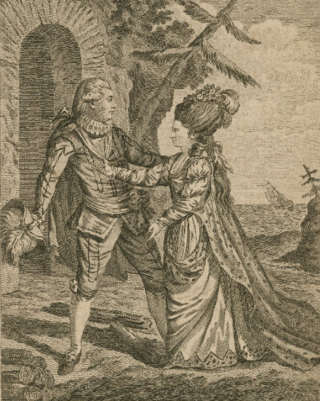
Mary Ann Wrighten Pownall, née Mary Matthews, was an English singer, actress and composer.

John Ward was an English actor and theatre manager. The founder of the Warwickshire Company of Comedians – a Birmingham-based theatre company who toured throughout the West Midlands and into Wales during the mid to late eighteenth century – he was the first of the Kemble family theatrical dynasty, whose most notable member was his granddaughter Sarah Siddons. Ward was the first recorded performer of a Shakespearian play in Stratford-upon-Avon, and is also notable as the author of the two earliest surviving prompt books of Shakespeare's Hamlet, which reveal how the play was performed in eighteenth century England and also throw light on earlier practice.
Jane Rogers was a British stage actress.
Anthony Boheme was a British stage actor of the eighteenth century.
Sarah Hamilton was an Irish stage actress and singer of the eighteenth century.
William Hamilton was an Irish stage actor of the eighteenth century.
Richard Winstone (1699-1787) was a British stage actor of the eighteenth century.
John Sowdon was an Irish stage actor, singer and theater manager in the eighteenth century.
James Rosco was a British stage actor. His name is also written as James Roscoe.
Charles Hulett (c.1700-1735) was a British stage actor. His name is sometimes written as Charles Hulet.
John Roberts was a British stage actor of the eighteenth century.
Thomas Smith was a British stage actor of the eighteenth century.
John Cushing (1719-1790) was a British stage actor.

George Mattocks (1735–1804) was a British stage actor and singer.
Thomas Barry (1743–1768) was an Irish stage actor and theatre manager.
Jane Rogers was an English stage actress. To distinguish her from her daughter she is sometimes referred to as Jane Rogers the Elder.
Richard Cross was a British stage actor.

Henry Harris was an English stage actor and theatre manager. Initially a painter he was a founder member of the new Duke's Company in 1660 following the Restoration which established itself at the old Salisbury Court Theatre before moving to the new Lincoln's Inn Fields Theatre shortly afterwards. Due to his background Harris may have been a set designer and painter during his early years with the company. However, by 1661 he was acting, and his first recorded role was in William Davenant's The Siege of Rhodes that summer. He quickly established himself as the second actor in the troupe after Thomas Betterton.
Michael Atkins (1747-1812) was an English-born Irish actor and theatre manager. He has been described as "the single most important person in the early history of theatre in Belfast.
Ann Heard (1750–1797) was an English stage actress and dancer. Born Ann Madden, she first appeared at the King's Theatre in London under the management of Spranger Barry in 1766. After dancing at Drury Lane the following year she joined the Theatre Royal, Covent Garden and continued to dance there until 1777. In 1771 she married William Heard, a physician and minor playwright with whom she had a daughter Elizabeth Heard. In 1783 she joined the company at Drury Lane, along with her daughter who performed as a child actor. By now she focuses principally on acting roles, often playing soubrettes. She remained at Drury Lane for the rest of her life, also appearing at Richmond and the Haymarket. Her daughter was also acting at both theatres, but was billed as Miss Heard to distinguish her from her mother.




